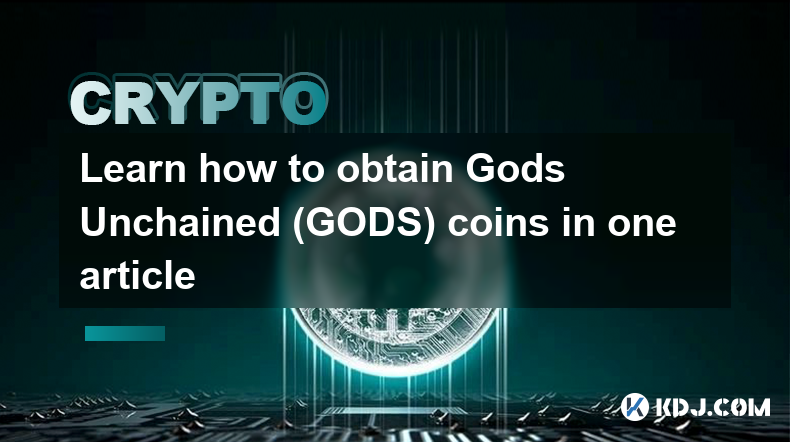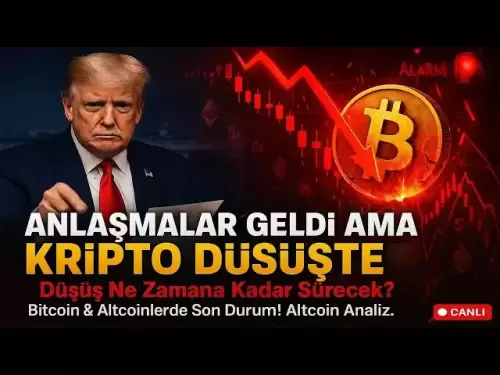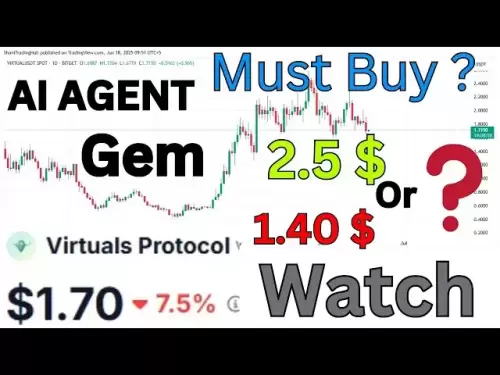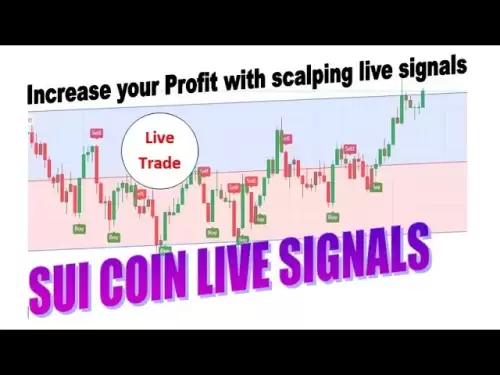-
 Bitcoin
Bitcoin $106,754.6083
1.33% -
 Ethereum
Ethereum $2,625.8249
3.80% -
 Tether USDt
Tether USDt $1.0001
-0.03% -
 XRP
XRP $2.1891
1.67% -
 BNB
BNB $654.5220
0.66% -
 Solana
Solana $156.9428
7.28% -
 USDC
USDC $0.9998
0.00% -
 Dogecoin
Dogecoin $0.1780
1.14% -
 TRON
TRON $0.2706
-0.16% -
 Cardano
Cardano $0.6470
2.77% -
 Hyperliquid
Hyperliquid $44.6467
10.24% -
 Sui
Sui $3.1128
3.86% -
 Bitcoin Cash
Bitcoin Cash $455.7646
3.00% -
 Chainlink
Chainlink $13.6858
4.08% -
 UNUS SED LEO
UNUS SED LEO $9.2682
0.21% -
 Avalanche
Avalanche $19.7433
3.79% -
 Stellar
Stellar $0.2616
1.64% -
 Toncoin
Toncoin $3.0222
2.19% -
 Shiba Inu
Shiba Inu $0.0...01220
1.49% -
 Hedera
Hedera $0.1580
2.75% -
 Litecoin
Litecoin $87.4964
2.29% -
 Polkadot
Polkadot $3.8958
3.05% -
 Ethena USDe
Ethena USDe $1.0000
-0.04% -
 Monero
Monero $317.2263
0.26% -
 Bitget Token
Bitget Token $4.5985
1.68% -
 Dai
Dai $0.9999
0.00% -
 Pepe
Pepe $0.0...01140
2.44% -
 Uniswap
Uniswap $7.6065
5.29% -
 Pi
Pi $0.6042
-2.00% -
 Aave
Aave $289.6343
6.02%
Learn how to obtain Gods Unchained (GODS) coins in one article
Participating in the Gods Unchained game by engaging in battles against other players and completing quests presents an exciting opportunity to earn GODS coins as rewards.
Dec 24, 2024 at 02:13 am

Comprehensive Guide to Acquiring Gods Unchained (GODS) Coins
Key Points:
- Understand the concept of Gods Unchained and its play-to-earn model.
- Explore diverse methods to obtain GODS coins, including gameplay, participation rewards, and external exchanges.
- Gain insights into the mechanics of gameplay, card collection, and earning through battles.
- Identify potential risks and rewards associated with each acquisition method.
Methods to Obtain Gods Unchained (GODS) Coins
1. Playing the Game: Battle Earning
Participate in the Gods Unchained game by building a deck of cards and engaging in battles against other players. As you win matches and progress through the game's rankings, you will earn GODS coins as a reward.
- Build a strong deck by strategizing card combinations and refining your skills through gameplay.
- Join tournaments and participate in special events to increase your earnings potential.
- Consider the costs associated with deck building, such as acquiring and upgrading cards.
- Manage your GODS earnings by saving them or using them to purchase additional assets within the game's ecosystem.
2. Daily Login Bonus: Participation Rewards
Enjoy a daily login bonus by logging into the Gods Unchained game regularly. This bonus is distributed in the form of GODS coins and other in-game rewards.
- Consistency is key, as bonuses are awarded for consecutive logins.
- Use your earned GODS coins to enhance your gameplay experience or contribute to the game's ecosystem.
- Be aware of potential restrictions and limitations on daily login bonuses.
3. Quest Rewards
Complete quests and challenges within the Gods Unchained game to earn additional GODS coins. Quests involve specific gameplay tasks, such as winning a certain number of battles or completing specific mission objectives.
- Embrace the challenges and engage in diverse gameplay modes to unlock rewards.
- Track your progress towards quest completion to maximize your earnings.
- Consider the time and effort required to complete quests and weigh it against the potential rewards.
4. Purchase on Exchanges
Acquire GODS coins through reputable cryptocurrency exchanges such as Binance, Coinbase, and KuCoin. These platforms facilitate the trading of GODS coins for fiat currencies or other digital assets.
- Register and verify your account on the exchange of your choice.
- Fund your account using supported payment methods, such as bank transfers or cryptocurrency deposits.
- Place an order to buy GODS coins at the desired price and quantity.
- Be aware of transaction fees, market volatility, and security considerations associated with purchasing on exchanges.
5. Card Marketplace Transactions
Participate in the Gods Unchained non-fungible token (NFT) card marketplace where users can buy, sell, and trade digital cards. Some of these cards may be purchased or sold in exchange for GODS coins.
- Collect rare and sought-after cards to potentially increase their value over time.
- Engage in strategic card trading to acquire desired cards or GODS coins.
- Be aware of market dynamics, such as card supply and demand, which can influence prices.
6. Referral Program
Encourage new players to join Gods Unchained using your referral link, which allows them to earn bonus rewards and potentially give you a commission in GODS coins.
- Share your referral link on social media, forums, and other online platforms.
- Invite friends and fellow gamers to join the Gods Unchained community.
- Be transparent about the potential rewards and conditions of the referral program.
7. Staking
Some platforms offer staking opportunities where users can deposit and lock their GODS coins to generate a passive income. Staking rewards are distributed periodically and can provide additional earnings over time.
- Choose a reputable staking platform that offers competitive rewards rates and ensures the security of your assets.
- Determine the duration and conditions of the staking program before committing your GODS coins.
- Carefully consider the withdrawal options and potential penalties associated with staking.
FAQs
What is the value of a Gods Unchained (GODS) coin?
The value of GODS coins fluctuates based on market supply and demand. At the time of writing, 1 GODS coin is approximately $0.245.
Is it possible to mine GODS coins?
Currently, GODS coins cannot be mined through traditional mining methods.
What are the risks of playing Gods Unchained?
As with any investment or game involving real-world value assets, there are associated risks. These risks include market volatility, loss of cards or assets due to hacking or fraud, and changes in game mechanics or reward structures.
How can I stay updated on Gods Unchained developments?
Follow the official Gods Unchained website (https://godsunchained.com/), social media channels, and community forums for the latest updates, announcements, and gameplay guides.
Disclaimer:info@kdj.com
The information provided is not trading advice. kdj.com does not assume any responsibility for any investments made based on the information provided in this article. Cryptocurrencies are highly volatile and it is highly recommended that you invest with caution after thorough research!
If you believe that the content used on this website infringes your copyright, please contact us immediately (info@kdj.com) and we will delete it promptly.
- Dogecoin Technical Analysis: Eyes on Price Targets Amid Market Swings
- 2025-06-18 19:05:12
- 2025-W Uncirculated American Gold Eagle and Dr. Vera Rubin Quarter Mark New Products
- 2025-06-13 06:25:13
- Ruvi AI (RVU) Leverages Blockchain and Artificial Intelligence to Disrupt Marketing, Entertainment, and Finance
- 2025-06-13 07:05:12
- H100 Group AB Raises 101 Million SEK (Approximately $10.6 Million) to Bolster Bitcoin Reserves
- 2025-06-13 06:25:13
- Galaxy Digital CEO Mike Novogratz Says Bitcoin Will Replace Gold and Go to $1,000,000
- 2025-06-13 06:45:13
- Trust Wallet Token (TWT) Price Drops 5.7% as RWA Integration Plans Ignite Excitement
- 2025-06-13 06:45:13
Related knowledge

How to customize USDT TRC20 mining fees? Flexible adjustment tutorial
Jun 13,2025 at 01:42am
Understanding USDT TRC20 Mining FeesMining fees on the TRON (TRC20) network are essential for processing transactions. Unlike Bitcoin or Ethereum, where miners directly validate transactions, TRON uses a delegated proof-of-stake (DPoS) mechanism. However, users still need to pay bandwidth and energy fees, which are collectively referred to as 'mining fe...

USDT TRC20 transaction is stuck? Solution summary
Jun 14,2025 at 11:15pm
Understanding USDT TRC20 TransactionsWhen users mention that a USDT TRC20 transaction is stuck, they typically refer to a situation where the transfer of Tether (USDT) on the TRON blockchain has not been confirmed for an extended period. This issue may arise due to various reasons such as network congestion, insufficient transaction fees, or wallet-rela...

How to cancel USDT TRC20 unconfirmed transactions? Operation guide
Jun 13,2025 at 11:01pm
Understanding USDT TRC20 Unconfirmed TransactionsWhen dealing with USDT TRC20 transactions, it’s crucial to understand what an unconfirmed transaction means. An unconfirmed transaction is one that has been broadcasted to the blockchain network but hasn’t yet been included in a block. This typically occurs due to low transaction fees or network congestio...

What to do if USDT TRC20 transfers are congested? Speed up trading skills
Jun 13,2025 at 09:56am
Understanding USDT TRC20 Transfer CongestionWhen transferring USDT TRC20, users may occasionally experience delays or congestion. This typically occurs due to network overload on the TRON blockchain, which hosts the TRC20 version of Tether. Unlike the ERC20 variant (which runs on Ethereum), TRC20 transactions are generally faster and cheaper, but during...

The relationship between USDT TRC20 and TRON chain: technical background analysis
Jun 12,2025 at 01:28pm
What is USDT TRC20?USDT TRC20 refers to the Tether (USDT) token issued on the TRON blockchain using the TRC-20 standard. Unlike the more commonly known ERC-20 version of USDT (which runs on Ethereum), the TRC-20 variant leverages the TRON network's infrastructure for faster and cheaper transactions. The emergence of this version came as part of Tether’s...

How to monitor large USDT TRC20 transfers? Tracking tool recommendation
Jun 12,2025 at 06:49pm
Understanding USDT TRC20 TransfersTether (USDT) is one of the most widely used stablecoins in the cryptocurrency ecosystem. It exists on multiple blockchains, including TRON (TRC20). The TRC20 version of USDT operates on the TRON network and offers faster transaction speeds and lower fees compared to its ERC-20 counterpart on Ethereum. When discussing l...

How to customize USDT TRC20 mining fees? Flexible adjustment tutorial
Jun 13,2025 at 01:42am
Understanding USDT TRC20 Mining FeesMining fees on the TRON (TRC20) network are essential for processing transactions. Unlike Bitcoin or Ethereum, where miners directly validate transactions, TRON uses a delegated proof-of-stake (DPoS) mechanism. However, users still need to pay bandwidth and energy fees, which are collectively referred to as 'mining fe...

USDT TRC20 transaction is stuck? Solution summary
Jun 14,2025 at 11:15pm
Understanding USDT TRC20 TransactionsWhen users mention that a USDT TRC20 transaction is stuck, they typically refer to a situation where the transfer of Tether (USDT) on the TRON blockchain has not been confirmed for an extended period. This issue may arise due to various reasons such as network congestion, insufficient transaction fees, or wallet-rela...

How to cancel USDT TRC20 unconfirmed transactions? Operation guide
Jun 13,2025 at 11:01pm
Understanding USDT TRC20 Unconfirmed TransactionsWhen dealing with USDT TRC20 transactions, it’s crucial to understand what an unconfirmed transaction means. An unconfirmed transaction is one that has been broadcasted to the blockchain network but hasn’t yet been included in a block. This typically occurs due to low transaction fees or network congestio...

What to do if USDT TRC20 transfers are congested? Speed up trading skills
Jun 13,2025 at 09:56am
Understanding USDT TRC20 Transfer CongestionWhen transferring USDT TRC20, users may occasionally experience delays or congestion. This typically occurs due to network overload on the TRON blockchain, which hosts the TRC20 version of Tether. Unlike the ERC20 variant (which runs on Ethereum), TRC20 transactions are generally faster and cheaper, but during...

The relationship between USDT TRC20 and TRON chain: technical background analysis
Jun 12,2025 at 01:28pm
What is USDT TRC20?USDT TRC20 refers to the Tether (USDT) token issued on the TRON blockchain using the TRC-20 standard. Unlike the more commonly known ERC-20 version of USDT (which runs on Ethereum), the TRC-20 variant leverages the TRON network's infrastructure for faster and cheaper transactions. The emergence of this version came as part of Tether’s...

How to monitor large USDT TRC20 transfers? Tracking tool recommendation
Jun 12,2025 at 06:49pm
Understanding USDT TRC20 TransfersTether (USDT) is one of the most widely used stablecoins in the cryptocurrency ecosystem. It exists on multiple blockchains, including TRON (TRC20). The TRC20 version of USDT operates on the TRON network and offers faster transaction speeds and lower fees compared to its ERC-20 counterpart on Ethereum. When discussing l...
See all articles

























































































